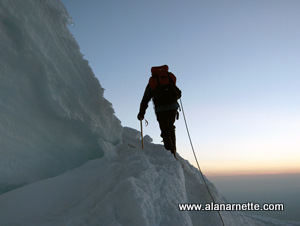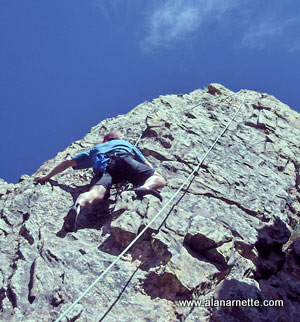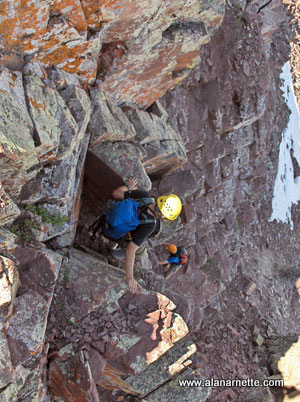The most often asked question of anyone who does a dangerous or
unique undertaking is "Why?" My altimeter watch shows that I have climbed
over 300,000 vertical feet, 90,000 on Everest expeditions alone. I must
like it! Here is my clumsy attempt to answer the question for me:
Why do you climb? An age-old question first publicly asked in the
1920s of George Mallory during his attempts on Everest. His incredibly
complex or dismissive answer was "Because it is there." Similar to
mine and no less understood by strangers, acquaintances, friends and
some of my family.
 To see the sun rise before it
does. To understand fellow climbers in an accelerated environment. An alternative
to the day-to-day world. To see if you can do it. To spend time with yourself
and see if you are really whom you think you are. To discover your limits. To see the sun rise before it
does. To understand fellow climbers in an accelerated environment. An alternative
to the day-to-day world. To see if you can do it. To spend time with yourself
and see if you are really whom you think you are. To discover your limits.
Climbing captures the allure and mystery of life for me. First there is the
peacefulness of being high on a mountain as the sun peaks around the Earth.
Then there is the camaraderie of friends being roped together as they work
up a mountain not as individuals but as a team. Finally, there is the challenge
of taking a step on a steep slope knowing that a mistake could be deadly but
the next step will be rewarding.
After six weeks of climbing up and down the Khumbu Icefall, Western Cwm and
Lhotse Face, I leaned heavily on my right knee. My headlamp showed pure white
snow at my foot - a sharp contrast to my bright yellow boots. I felt another
wave coming over me. I gagged once again and struggled for breath. Even with
my oxygen bottle turned on, I was having serious difficulties at 27,200' on
Mt. Everest. After a quiet discussion with myself, I turned around to return
to the South Col and Camp 4. My 2002 summit of Everest would have to wait.
A test of my body or of my mind?
 France,
Tour Ronde, 1996, I am climbing a 60% slope on mixed ice and rock. I am roped
to Jouergen, my German guide. I thought I was in good shape but this 12,000-foot
peak is testing my condition. I plant my ice axe in one secure position and
then another. I concentrate on kicking the front points of my crampons solid
into the ice. At ten thousand feet it is easy, and then the summit tests my
strength. I take each step one by one. Jouergen asked me if I am tired. I answer "no".
He replies "I would be surprised if you were not." An instant dose of reality.
From now on, I tell the truth. France,
Tour Ronde, 1996, I am climbing a 60% slope on mixed ice and rock. I am roped
to Jouergen, my German guide. I thought I was in good shape but this 12,000-foot
peak is testing my condition. I plant my ice axe in one secure position and
then another. I concentrate on kicking the front points of my crampons solid
into the ice. At ten thousand feet it is easy, and then the summit tests my
strength. I take each step one by one. Jouergen asked me if I am tired. I answer "no".
He replies "I would be surprised if you were not." An instant dose of reality.
From now on, I tell the truth.
I once heard that adventure is defined as when you are doing it you pray to
God to get you out alive and once it is over you pray to God to do it again.
Alaska, the Granite Range, 1999, Howie and I are almost up the couloir when
we hear the telltale CRACK of ice breaking. We instantly fall to the snow,
plant our ice axes, cover our heads and hold on to each other. The fall passes
and we acknowledge the danger with a smile. It was a small "water-fall" avalanche
that covered us with ice, snow and rock. Twenty minutes later, another covers
us and Howie looks at me with the unspoken question to which I respond "Let's
go down."
Danger seems to drive the adrenaline that keeps us going. Maybe this is a commentary
on the lack of excitement in our everyday lives. While watching the soccer
game or band concert brings family satisfaction, it is often what we do for
ourselves that brings personal satisfaction.
 Climbing
is a sport that requires you to be fit, mentally in control, a team player,
patient and accepting of failure. This last characteristic is very misunderstood.
Consider spending from 6 to 18 weeks attempting a summit only to be turned
back by weather, equipment failure, your own inadequacies or something else:
a team-member's inadequacy. Do you place blame or just go on? What do you
learn? Climbing
is a sport that requires you to be fit, mentally in control, a team player,
patient and accepting of failure. This last characteristic is very misunderstood.
Consider spending from 6 to 18 weeks attempting a summit only to be turned
back by weather, equipment failure, your own inadequacies or something else:
a team-member's inadequacy. Do you place blame or just go on? What do you
learn?
My life is a balance of three areas: family, work and myself. I try to focus
on each area while not ignoring another area. I find that when I get out of
balance, my overall happiness suffers as does the other areas. My personal
time is focused on climbing, today.
Mountains test your "essence". They bring out your best and your worst. They
are completely unforgiving, impersonal and answer to no higher authority. When
you agree to climb one of these high mountains, you declare formally or informally
how to dispose your body upon death. This exercise makes declaring beneficiaries
simple.
August 1997, and I are sitting on our patio and discussing my "body disposal" assuming
the worst for the upcoming Cho Oyu expedition. I have the legal form on the
table for both of us to read. The choices: 1) bury on the mountain, 2) cremate
in Katmandu or 3) return to your home. By the way, choices 2 and 3 are conditional
upon being able to get your body off the mountain - highly unlikely in the
vast majority of the cases.
Why does someone go on these expeditions knowing what you know? Many people
I have met on these expeditions are very successful in life already. Almost
everyone has the full support of the closest family members. For me this is
without question and gives me strength. So why risk EVERYTHING for a mountain
summit?
 Standing
on the summit of Ama Dablam, October 2000, I feel grateful. It was only 3
years ago when I first saw this beautiful mountain and privately declared
it an impossible dream. It was too high, too steep and too technical plus
I had neither the time nor the money to climb these "impossible" mountains.
I was happy just trekking in the Khumbu. But something got inside me on that
trip. I could feel my lungs crying out yearning for more oxygen. I could
see myself taking one slow step, stopping for a deep breath and then forcing
another step. I could see myself pushing towards the summit. Standing
on the summit of Ama Dablam, October 2000, I feel grateful. It was only 3
years ago when I first saw this beautiful mountain and privately declared
it an impossible dream. It was too high, too steep and too technical plus
I had neither the time nor the money to climb these "impossible" mountains.
I was happy just trekking in the Khumbu. But something got inside me on that
trip. I could feel my lungs crying out yearning for more oxygen. I could
see myself taking one slow step, stopping for a deep breath and then forcing
another step. I could see myself pushing towards the summit.
I read the message on New Years Eve 2003, David Hiddleston had died
on Mt Tasimen in an avalanche. My friend and my guide on Ama Dablam
and Everest was gone. Doing what he loved. His friends and family,
in their grief, expressed their understanding.
Lying in the medical tent with an IV in my arm, I think about the last six
days, the last six weeks. Everest had been hard, very hard. I was suffering
from a bacterial lung infection and dehydration. I was glad to be back in base
camp after a two day ordeal from the Balcony. No regrets, no self-absorbed
pity party - at least at that time. Get to Katmandu and then Colorado and then
maybe I could reflect on the experience. Consider what had happened, what I
learned and what next. Attempt peaks a lower altitude. Go after more technical
mountains? Maybe rock climb the locals. Canada, there a lot's of mountains
there! Or should I stop climbing while I am still alive?
June 2006. At 20,800' on Broad Peak I am having the best day and the
worst day. The snow under my crampons is soft yet solid. The views
of K2 and the Godwin-Austin Glacier are mind-blowing. I see my friends
ahead and behind me and draw comfort from their company. However, deep
inside, I know it is over. The body is not right. The risks too high.
Time to come home. Before ...
I wrote in a dispatch from Broad Peak "... as I prepare to go
up the Hill, I ask for all your positive energy for me and my teammates.
Wilco and Gerrard are making their bid tonight. More climbers tomorrow
and more later. We will move from camp to camp higher up the Hill and
make the final bid from Camp 4. The whole process will take 4 or 5
days. This is why we are here. This is when the test really begins.
There are a thousand reasons to stop and only a few to push on. And
those are personal and unique to each climber. Please accept our love
of mountaineering. Please accept our result regardless of what it is.
Please know that this is what makes us alive, it is the fuel that drives
us on an individual level ..."
So, Why? Is the answer to reach the ever-higher altitudes on earth? Or is climbing
simply a way of seeing how far you can take yourself? The brutal honesty it
forces? The clear understanding of the consequences? The bonds developed when
life is simplified? The insight that personal growth is accelerated when you
push? Or is it just because?
|

